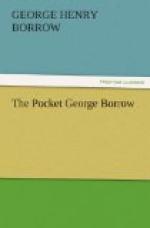Now real Republicanism is certainly a very fine thing, a much finer thing than Toryism, a system of common robbery, which is nevertheless far better than Whiggism—a compound of petty larceny, popular instruction, and receiving of stolen goods. Yes, real Republicanism is certainly a very fine thing, and your real Radicals and Republicans are certainly very fine fellows, or rather were fine fellows, for the Lord only knows where to find them at the present day—the writer does not. If he did, he would at any time go five miles to invite one of them to dinner, even supposing that he had to go to a workhouse in order to find the person he wished to invite. Amongst the real Radicals of England, those who flourished from the year ’16 to ’20, there were certainly extraordinary characters, men partially insane, perhaps, but honest and brave—they did not make a market of the principles which they professed, and never intended to do so; they believed in them, and were willing to risk their lives in endeavouring to carry them out. The writer wishes to speak in particular of two of these men, both of whom perished on the scaffold—their names were Thistlewood and Ings. Thistlewood, the best known of them, was a brave soldier and had served with distinction as an officer in the French service; he was one of the excellent swordsmen of Europe; had fought several duels in France, where it is no child’s play to fight a duel; but had never unsheathed his sword for single combat, but in defence of the feeble and insulted—he was kind and open-hearted but of too great simplicity; he had once ten thousand pounds left him, all of which he lent to a friend, who disappeared and never returned him a penny. Ings was an uneducated man, of very low stature, but amazing strength and resolution; he was a kind husband and father, and though a humble butcher, the name he bore was one of the royal names of the heathen Anglo-Saxons. These two men, along with five others, were executed, and their heads hacked off, for levying war against George the Fourth; the whole seven dying in a manner which extorted cheers from the populace, the most of them uttering philosophical or patriotic sayings. Thistlewood, who was, perhaps, the most calm and collected of all, just before he was turned off, said, ’We are now going to discover the great secret.’ Ings, the moment before he was choked, was singing ’Scots wha hae wi’ Wallace bled.’ Now there was no humbug about those men, nor about many more of the same time and of the same principles. They might be deluded about Republicanism, as Algernon Sidney was, and as Brutus was, but they were as honest and brave as either Brutus or Sidney, and as willing to die for their principles. But the Radicals who succeeded them were beings of a very different description; they jobbed and traded in Republicanism, and either parted with it, or at the present day are eager to part with it, for a consideration.
* * * * *




